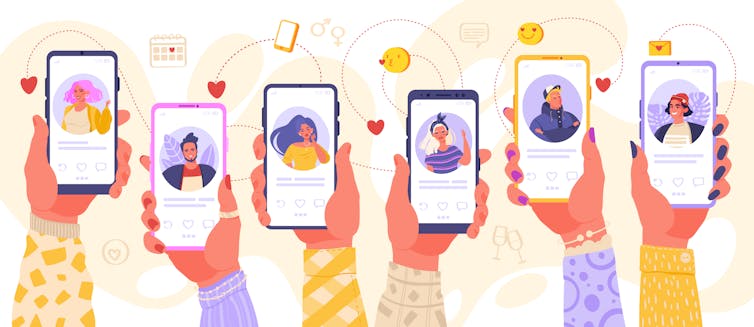A robust intuition once we meet somebody we’re drawn to is to attempt to please them – and we naturally assume that one of the best ways we would do that is to point repeatedly how aligned we’re with their views and selections on all issues nice and small.
On an early date, after they occur to say that they love dancing, we’ll subsequently sign that in fact we love golf equipment as nicely. Or after they clarify how boring they discover museums, we’ll disguise that on a visit to Berlin final yr, we spent an entire fascinating day within the galleries of the Altes Museum.
We could not state direct falsehoods however we’ll stretch and bend the reality to its limits in order to create an impression of near-total alignment. Our will-to-please can attain a peak round intercourse: we naturally can’t threat introducing them to the precise byways of our erotic creativeness. We simply declare to need – by miracle – precisely what they need.
Alongside the best way, it hardly ever happens to us that they could be performing among the similar rigmarole for us, that they may even be adjusting their self-presentation in delicate however highly effective methods to slot in with what they take to be our preferences and values. There’s a tragi-comic facet to our deepening mutual attraction. Two first rate individuals are attempting to be as good as they’ll. Nobody is getting down to deceive and but, progressively, a set of vastly deceptive and harmful concepts about who every particular person actually is, are getting established.

Our overwhelming will-to-please can encourage us to maneuver in collectively and later to marry. After which – inevitably – the extended, intimate scrutiny that coupledom brings will reveal the dimensions of our mistaken expectations. In a sequence of disillusioning phases, we’ll every be saddened, upset and shocked to find who we have now ended up with. There shall be recriminations, rows and fragile reconciliations till, in the long run one or different occasion involves the grim, however nonetheless stunning conclusion that we had been by no means suitable.
Or we could stick at it with rising distress. We are going to face a life-time of holidays that by no means contain the museum visits we crave. We should resign ourselves to by no means having had the sort of intercourse we would like. Or, much more grievously, we’ll finally embark on a furtive life; we’ll search out the moments after they’re away to pursue wants we’ve pretended to not have. Till at some point our double-life is uncovered – and we’ll drown in bitterness, fury and sorrow.
But the origin of such nightmares was solely ever a vastly touching, however painfully flawed and dangerous, devotion to being a straightforward match. We needed to be easy; and but we have now ended up with a really difficult mess.
A genuinely easier method is to be considerably advanced from the beginning. When dancing comes up, the smart lover ought to instantly describe their loathing of the exercise; when the museum theme is raised, they need to frankly evoke their ardour. Relating to their routines and tastes, they need to dare to say their pleasure in a really well-wiped kitchen work-top or clarify what it means to them to be awake within the early hours, when the world remains to be sleeping and their thoughts is at its most adventurous.
There is no such thing as a should be brazen or demanding. And there’s no requirement that our date agree and even stick round past dessert (or the principle course). Some will run away and will.
In an effort to disclose our truths, we’d like a primary sense of acceptability, we should know that we aren’t good however that we aren’t for that matter wholly abject or shameful. Our perspective to the kitchen could be a little bit extreme with out being delusional. Our very early rising could be unconventional, but it surely’s completely sane – all issues thought-about. Round intercourse, we all know {that a} choice could be statistically uncommon with out lapsing into evil. Our interior conviction that our oddities are primarily cheap permits us to current ourselves to a different particular person with out worry or defensiveness.
Our candour then arms us with the suitable to ask the opposite to disclose – with comparable honesty – what could also be particular person and tough about their very own characters. In the event that they insist that they’re actually quite simple and ‘straightforward’, we’re allowed to be gently however firmly sceptical. They’re a human being, and to be human is to be difficult. It can not probably be true that they exist with out important quirks. The issue with any potential companion isn’t that they’re too bizarre, however that they haven’t come to phrases with their distinctiveness or discovered a language wherein to introduce others to who they’re in a approach that could be plausibly understood and accepted.
Being easy on dates is in the long run a mechanism for 2 individuals to fast-forward time – and to spare themselves agony within the course of. We must always know {that a} polished floor isn’t a real image of who anybody may be. Solely as soon as our mutual complexities have been outlined can we sense, with huge aid, that we’re within the presence of a fellow mature and pleasingly direct particular person. We can have the easier relationships we need, once we can dare to disclose and accommodate the precise complexities of human nature.





